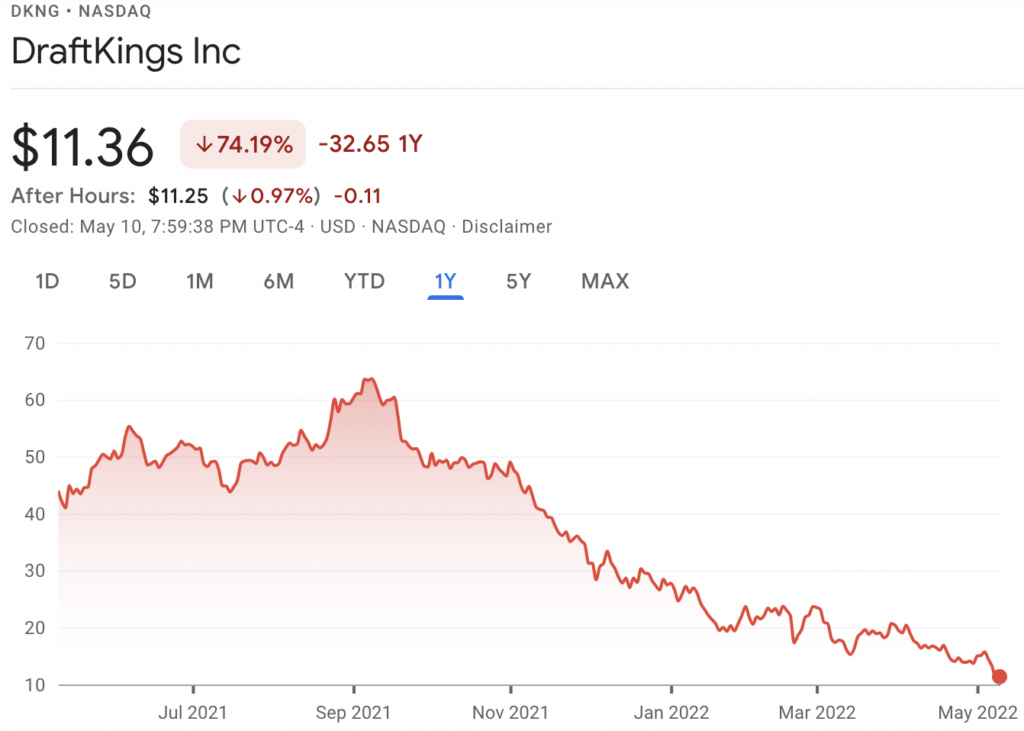Now we know what a bear market feels like once again. The falls suffered across the wider market on Friday and then again on Monday are a reminder that all bull markets – eventually – come to an end.
All things must pass, even irrational exuberance. Or should that be, especially irrational exuberance?
The financial pundits can now bust out their dusty old books on famous crashes from the past and we all get to reacquaint ourselves with the old adage that share prices can indeed go down as well as up.
For the listed betting and online gaming sector in the US, this is a first.
Ironically, perhaps, even in Europe the sector was too nascent to suffer from the bursting of the dotcom bubble at the turn of the Millennium.
In the US, of course, it wasn’t even on the radar.
To coin a phrase oft-heard when the bulls are in evidence, this time it’s different. And it really is different.
There are now a number of pure-play online betting and gaming listed operators and the biggest names in gaming are as enmeshed with online betting and gaming as they have ever been.
Timing could have been better
Worse, and genuinely through bad timing, such is the sector’s luck that investors’ loss of confidence in equities comes at the very moment when it is struggling to prove its prospects for profitability any time soon. Like real soon. Like this quarter.
In relation to this slice of dumb luck, a quote this week from Bloomberg’s Matt Levine is worth taking a look at.
“In a world where money is cheap and plentiful, losing a lot of it for the foreseeable future in order to grab a share of huge faraway profits can be a reasonable strategy, or at least one that can attract investors,” he wrote in his regular column on Monday/Tuesday.
“In a world of higher discount rates, making money now is distinctly preferable to losing it. A seismic shift.”
Betting and gaming and the new landscape
So how are some of the most high-profile names in the sector placed for this seismic shift?
The answer is not good going by the share price falls of some of the biggest names. DraftKings, for instance, fell double digits on Monday and despite a dead-cat bounce on Tuesday was languishing at $11.36 ahead of Wednesday’s trading.
In the year-to-date, it is off by 59% and 75% in the last 12 months with its fall from its all-time high of above $63 even more precipitous.

The rest of the sector – or at least those with a substantial enough part of their futures staked on OSB and icasino – have fared no better. RSI is down 65% YTD; Penn National is down nearly 40% over the same period, Caesars is down over 45% and MGM Resorts is down by 20%.
The picture is not really any better for the Europeans; Entain is down 26%, Flutter down by 28% and 888 is down by nearly 40%.
Investors sitting this one out
John DeCree, analyst at CBRE, said this week he recommends investors in DraftKings “remain on the sidelines” while the selling pressure on consumer tech stocks mounts.
Indeed, in this sense DeCree is a follower, not a leader: as he points out, for some months now investors have “grown increasingly skeptical of both the TAM and profitability” of the entire US sports betting and iGaming industry.
“The lack of regulatory progress on the more lucrative iGaming segment leaves investors less convinced about the long-term profitability of a sports-only business in much of the US.
“Moreover, with steep losses being incurred in 2022 and likely in 2023, investors have virtually no interest in betting on the out years.”
This might be sound advice for investors. But where does it leave the sector? Bear markets aren’t just about share prices.
They are often the signal that a wider economic downturn is upon us. It is no surprise that there has been much questioning during the ongoing earnings season call with analysts about ‘the macro thing’.
Gas price rises, inflation and supply chain issues are the stuff of recessions, another big issue that the US online sector has never faced before.
Fading bulls
In the face of these pressures, it is no surprise that last year’s euphoria has almost entirely dissipated.
It has been replaced by much more uncertainty around profitability and, going by the DraftKings call just last week, more of an emphasis on things like cost-cutting and paring expenses (or just shifting them to subsequent quarters, but as the phrase goes, every little bit helps).
This goes back to Levine’s second point – investors are likely to favor companies that are making money rather than losing it and here, at least, the betting and gaming companies should find themselves in a more favorable position.
No one disputes that over time, betting and gaming – unlike, say, ride-hailing – will be a very profitable business. Its long-term prospects are good. Very good, in fact, and with more states destined to open up to both online sports betting and online gaming, profitability will follow.
It’s just that getting there will be a bumpier ride than was thought likely when the whole charabanc kicked off in 2018.
One last coda; CBRE also suggested that “the consensus view” is that DraftKings will “ultimately need to raise money by the end of 2023”.
“We are forecasting the company to end FY23 with about $494m of cash, though we suspect this number could be less if several more states launch between now and then.”
As and when the company gets around to announcing that one will be interesting. Bears are particularly fearsome when it comes to companies making cash calls. The company will be hoping its date with destiny comes once a stock market recovery is well underway.
